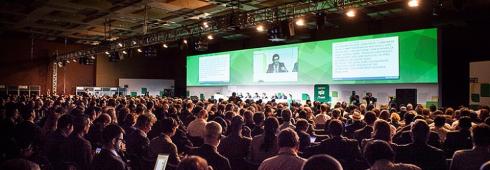
The South Korean Civil Society Statement on NETmunidal

This is a new chapter in building participatory and democratic Internet governance
We welcome the Multistakeholders’ Declaration of Sao Paulo
On 23-24, April, a global multistakeholder meeting on Internet governance , “NETmundial,” was held to discuss the Internet Governance Principles and future approaches in Sao Paulo, Brazil. This meeting was considered historic in that it enabled multistakeholder participation during the process, enabling governments, civil societies, private sectors, technical communities, and academia, etc., to participate in the process of determining the final resulting content of meeting. Over 180 contributing opinions were submitted during the opinion submission phase before the conference, and the “draft outcome document” that was prepared by the Executive Multistakeholder Committee based on the contributions produced over 1370 comments prior to the actual meeting. The two-day face-to-face meeting also provided open-microphone opprtunities for the respective stakeholders to voice additional opinions. The final document, the “Net-mundial Multistakeholders’ Declaration of Sao Paulo” on Internet governance was praised by many to be the result of an unprecedented process of global multistakeholder participation, and was accepted through a rough consensus.
The first global declaration based on a rough consensus of multistakeholders
A key concept that was included in the title of the meeting was “Multistakeholder” which means that multistakeholders, i.e., the government, civil societies, technical communities and academias, and the individual users can participate in the Internet public policy decision-making process with equal status and in a democratically participatory fashion. When we consider the fact that existing “international declarations” have been issued exclusively either by intergovernmental/international bodies or by global civil societies, the Sao Paulo declaration takes on the special status of being the first global ‘multistakeholder’ declaration where relevant stakeholders were given horizontal status during the deliberation process and were able to arrive at a general consensus in an open and transparent manner.
However, this goal of multistakeholder consensus inevitably resulted in a final declaration not being able to accommodate many of the important issues that were supported by civil societies. Adoption of a clear statement endorsing net neutrality was passed over to future discussions, and we had to accept general statements on human rights that did not touch on specific and importanrt human rights clauses for freedom of expression, privacy, etc. In addition, the final document contained limited wording against mass surveillance although the Brazillian president’s UN speech denouncing mass surveillance by the US had been one of the main stimulants behind the current meeting and demands that mass surveillance and surveillance of the telecommunications network in general be banned had been one of the important issues that had been proposed for the meeting.
Despite the above limitations, we believe that this declaration is the result of a successful experiment, providing a cornerstone model for making the Internet public policy decision-making processes to be more transparent, democratic, and cooperative by allowing the participation of various players. The shortcomings that were revealed during this meeting should be amended and improved through future fora flexibly for discussing Internet governance such as the IGF.
The South Korean government recognizes the need for a system of multistakeholder participation at the national level.
The multistakeholder approach was identified as one of the most important principles at the national as well as the global level during this meeting. It was observed that Brazil was able to take on the role of being the host of this meeting because of their domestic multistakeholder Internet policy body, the CGI.br, and members of this organization played principal roles in organizing and administering the details of this meeting. In addition, the culmination of one of the achievements of CGI.br that was reached through a bottom-up process was proudly displayed to the global community when the Brazilian president signed the national Marco Civil during the opening ceremony of NETmundial.
The South Korean government also publicly declared support for the Multistakeholder model in their contributing statement prior to the meeting as well as in the statements made by the governmental representatives during this meeting. We praise this stance of the Korean government as acknowledging the necessity for the existance of a multistakeholder participatory policy body on Internet governance, in line with the recommendations of the Sao Paulo declaration.
Thus, we would like to suggest that we begin collaborative discussions on the formation of a domestic multistakeholder Internet governance body similar to CGI.br. As major representatives of the South Korean civil society, we would like to express our support for the democratic multistakeholder process that was proposed in NETmundial and declare our committment to achieving this goal not only at the global level but also at the domestic level, in cooperation with the various stakeholders.
Thanks, Edward Snowden
The breaches on human rights through mass surveillance by many governments that were exposed as a result of Edward Snowden’s revelations caused a huge outrage among the global Internet users. The denouncement of such activities by global Internet users provided the impetus for this meeting in Brazil.
We believe that Snowden has enabled the activities of ordinary Internet users around us – those that exist peacefully on the Internet, living, loving, working and dedicating their individual expertise – to be recognized as major sources behind the creation of an Internet based on protecting human rights and contributing to a global, resilient, trustworthy, open and flexible Internet. In this regard, the civil society of Korea would like to express our deep appreciation to the courage of Edward Snowden for inspiring such discussions.
We hope Snowden gets back home safe.
2014. 4. 28.
경실련(CCEJ, Citizens’ Coalition for Economic Justice)
망중립성 이용자 포럼(Net Neutrality User Forum)
오픈넷 (Opennet)
진보네트워크센터(Korean Progressive Network Jinbonet)
프라이버시 워킹그룹(Privacy Working Group Korea)
함께하는시민행동 (Citizens’ Action Network)
Reference
The Multistakeholders’ Decaration of Sao Paulo http://netmundial.br/netmundial-multistakeholder-statement/
The Korean Civil Society statement submitted to NETmundial
http://content.netmundial.br/contribution/korean-civil-society-submission-for-netmundial/146
The South Government statement submitted to NETmundial
http://content.netmundial.br/contribution/the-korean-government-s-submission-for-netmundial/255
Nnenna Nwakanma speech https://bestbits.net/nnenna-netmundial/
2014-04-27